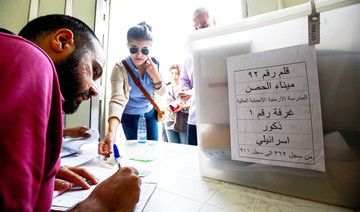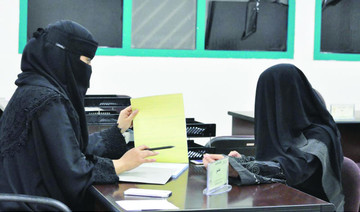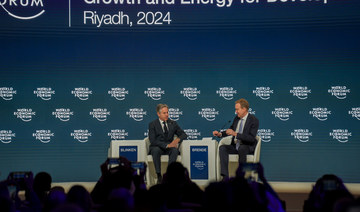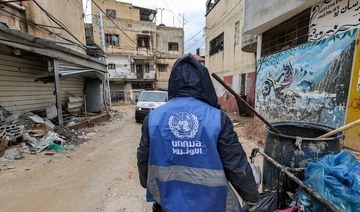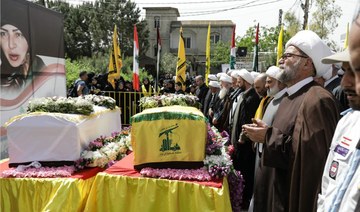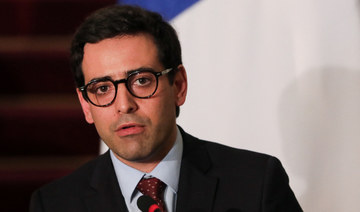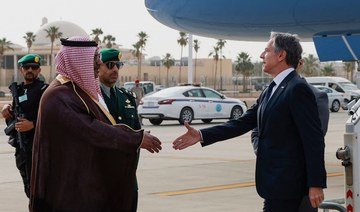BEIRUT: Lebanon’s polling stations opened Sunday for the first parliamentary elections in nine years, with people lining up early in the morning to take part in a vote that is fiercely contested between rival groups backed by regional and international powers.
Sunday’s vote is taking place amid tight security, with army and police forces deployed near polling stations and on major intersections. Electoral campaigns have been tense as each group has mobilized its supporters, with fist fights and shootings occurring in several areas in recent weeks.
The main race is between a Western-backed coalition headed by Prime Minister Saad Hariri and the Iranian-backed Hezbollah group. The vote also reflects regional tensions between Sunni powerhouse Saudi Arabia and Iran, which back the rival groups.
The vote is the first since Syria’s war broke out in 2011. Hezbollah has sent thousands of fighters to back President Bashar Assad’s forces, a move that has been harshly criticized by many Lebanese, mainly Sunni Muslims and Christians who see the group as pulling the country into regional conflicts.
The house’s term was supposed to expire in 2013, but lawmakers have approved several extensions since then, citing security concerns linked to the spillover from Syria’s war. Lebanese who support opposing sides in the war have clashed on a number of occasions, and Sunni extremists have carried out several bombings. The war next door driven more than a million Syrian refugees into Lebanon, straining the country’s economy and infrastructure.
There are about 3.6 million eligible voters, and early results are expected after polling stations close at 7 p.m. (1600 GMT). Some 586 candidates, including 86 women, are running for the 128-seat parliament, which is equally divided between Muslims and Christians.
This year’s vote is according to a new election law that is based on proportional representation, implemented for the first time since Lebanon’s independence in 1943. Voters will choose one list of allied candidates, as well as a preferred candidate from among them.
In the past, the winning list took all the seats in the electoral district.
Hezbollah and its allies are likely to add more seats, while Hariri is likely to lose several. Some of his Sunni supporters see him as being too soft on Hezbollah, and the billionaire businessman has also faced criticism after laying off scores of employees from his companies in Lebanon and Saudi Arabia.
Still, Hariri will most likely be named to form a national unity Cabinet after the vote. Rival sides can hardly govern effectively without each other, and are expected to recreate the unity government that currently exists, which includes Hezbollah.
The vote comes a week after Lebanese living oversees voted in 39 countries around the world for the first time ever.
Lebanon holds first elections in 9 years
Lebanon holds first elections in 9 years
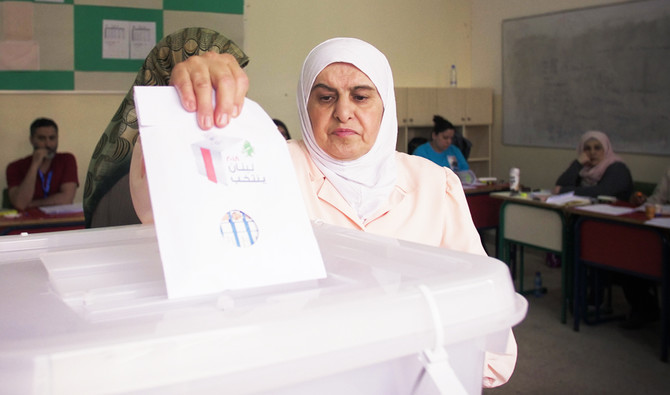
- Polls close at 7p.m local time in Lebanon's first election in nine years
- The main race is between a Western-backed coalition headed by Prime Minister Saad Hariri and the Iranian-backed Hezbollah group
Likely attack by Yemen’s Houthis targets a vessel in the Red Sea
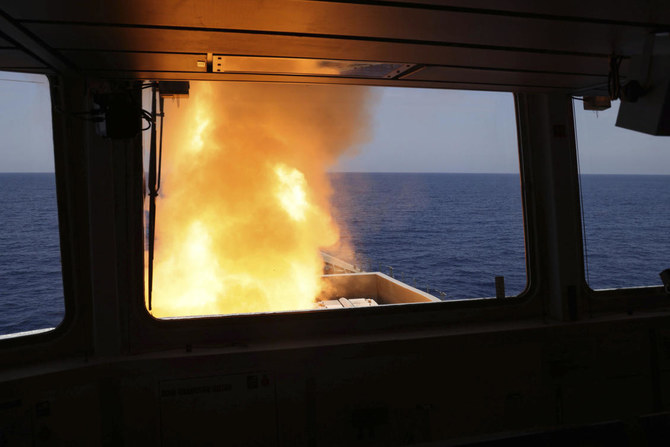
- The attack happened off the coast of Mokha, Yemen
- The Houthis did not immediately acknowledge any attacks
JERUSALEM: A suspected attack by Yemen’s Houthis targeted a vessel in the Red Sea on Monday, authorities said, the latest assault in their campaign against international shipping in the crucial maritime route.
The attack happened off the coast of Mokha, Yemen, the British military’s United Kingdom Maritime Trade Operations center said, without offering any other immediate details.
It urged vessels to exercise caution in the area.
The Houthis did not immediately acknowledge any attack there, though suspicion fell on the group. It typically takes the rebels several hours before claiming their assaults.
The Houthis say their attacks on shipping in the Red Sea and Gulf of Aden are aimed at pressuring Israel to end its war against Hamas in Gaza, which has killed more than 34,000 Palestinians there. The war began after Hamas-led militants attacked Israel on Oct. 7, killing 1,200 people and taking some 250 others hostage.
The Houthis have launched more than 50 attacks on shipping, seized one vessel and sank another since November, according to the US Maritime Administration.
Houthi attacks have dropped in recent weeks as the rebels have been targeted by a US-led airstrike campaign in Yemen. Shipping through the Red Sea and Gulf of Aden has declined because of the threat.
American officials have speculated that the rebels may be running out of weapons as a result of the US-led campaign against them and after firing drones and missiles steadily in the last months. However, the rebels have renewed their attacks in the last week.
The Houthis on Saturday claimed it shot down another of the US military’s MQ-9 Reaper drones, airing footage of parts that corresponded to known pieces of the unmanned aircraft. US Air Force Lt. Col. Bryon J. McGarry, a Defense Department spokesperson, acknowledged to The Associated Press on Saturday that “a US Air Force MQ-9 drone crashed in Yemen.” He said an investigation was underway, without elaborating.
Nations must find ways to unite on ‘issues that affect planet’: UAE adviser
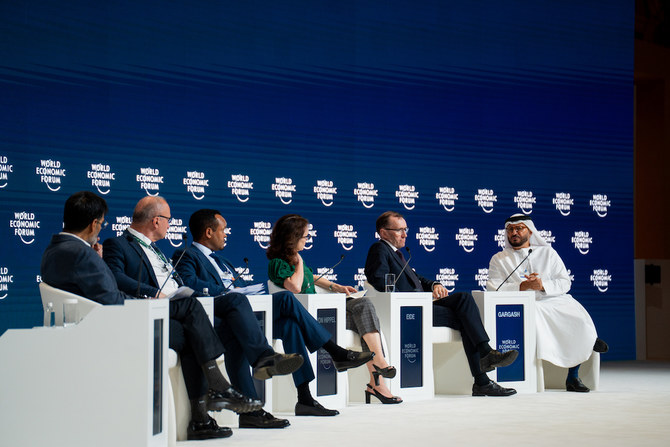
- Tech, climate are key, says Anwar Gargash at World Economic Forum
- Norway FM highlights credibility ‘crisis’ of global, Western institutions
RIYADH: Nations must look for ways to unite on issues that “affect the planet” for the prosperity and stability of the global community, a senior UAE official told a World Economic Forum session here on Monday.
“We have to find a way that non-geostrategic issues should bring us together, rather than take us apart. I think technology, climate should bring us together because we have a vested interest,” said Anwar Gargash, diplomatic adviser to the UAE president, during a panel discussion titled “Rising Powers for a Multipolar World.”
“We might all argue about who pays what, how fast it should go … but ultimately we should recognize that these issues that affect the planet are issues that we will all suffer from,” he added.
Gargash said that “to some certain extent we have a knack for politicizing these issues rather than making these issues an adhesive that brings us together.”
Another panelist, Croatia’s Foreign Affairs Minister Gordan Grlic Radman emphasized the importance of multilateral relationships, “not replacing them … and not watering down rules-based order. Rules are there to respect them.”
Espen Barth Eide, Norway’s foreign affairs minister, added that the global community was experiencing a crisis of credibility. This has been exacerbated by the situation in Gaza and by “the inability of many Western countries who have hesitated to use the same type of language … they used against Russia.”
“When it comes to Gaza, we have not been able to see the same type of response … the way that Israel has conducted the war has also been very problematic in light of global norms. If we do not call out that it comes back and haunt even the arguments on Ukraine,” Eide said.
“To be frank it is a crisis of Western-initiated values, but they also have turned into a crisis of institutions. The response to that is to be very clear on our own practice, as Norway, with friends. If we believe certain things are right or wrong, we should apply them consequentially across the board.”
Gargash said that building bridges and making friends has been the UAE’s strategy. “We see ourselves more on the geo-economic phase of our foreign policy. That in itself reflects what are our priorities with regards to BRICS or any other international organization we seek to join.
“We are increasing and concretizing the sort of bridges that we have. We are looking at it more on the geo-economic perspective. We have no interest in creating further schisms within the international system. We have an interest in being able to reach out on all our friends, and create more opportunities.
“Countries like us cannot afford to be fatalistic, and see this things are happening anyway. I think we need to work, whether in smaller or larger groups, it depends really on the situation … whether we will be more effective working with an Arab consensus, then we will do it.
“We are interested in joining many other organizations, we are looking at it from the perspective of having more friends, more bridges, more economic opportunities rather than a rejection of something and an adoption of something else.”
Citing the China-US relationship in the past, the UAE official said that “we should remember that this is not 1945, it is our duty as other countries to emphasize always that we are not at that moment and we do not want to recreate that bipolarity of the past.”
Gargash added: “The important thing is it is our job, whenever the China-US relationship is on the table, not to think in (a) 1945 framework but to say this is a different world. India today is not the India of 1945, Europe is not the Europe of 1945. There are many other players, we cannot ease the other players out and think of just the two major parties.”
Red Cross has no mandate to replace UNRWA in Gaza, chief says
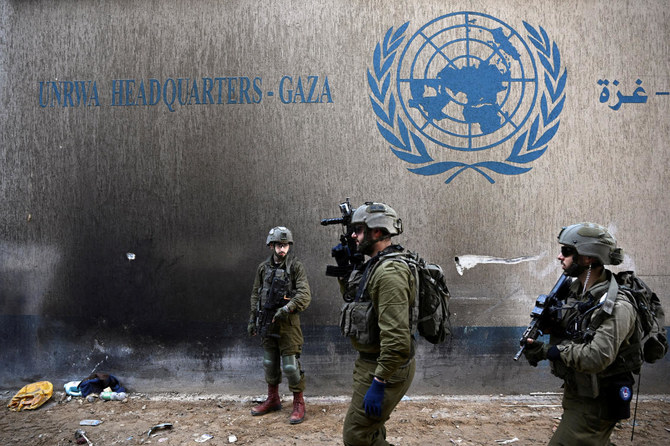
- Earlier report concluded that Israel had failed to furnish proof that some UNRWA employees had links to “terrorist organizations” such as Hamas
GENEVA: The International Committee of the Red Cross (ICRC) does not have a mandate to replace the United Nations agency for Palestinian refugees in Gaza, its director general said in comments published on Monday.
UNRWA was swept into controversy in January when Israel accused 12 of its 30,000 employees of being involved in the October 7 Hamas attacks which led to the deaths of around 1,160 people — mostly civilians — according to an AFP count based on official Israeli figures.
Israel’s retaliatory offensive has killed nearly 35,000 people in Gaza, mostly women and children, according to the health ministry in the Hamas-run Palestinian territory.
The UN immediately fired the implicated staff members and launched an internal investigation to assess the agency’s neutrality.
“We have completely different mandates,” ICRC director general Pierre Krahenbuhl told Swiss daily Le Temps in an interview.
UNWRA’s mandate “comes from the UN General Assembly, the ICRC’s from the Geneva Convention. The ICRC cannot take over UNRWA’s mandate,” he said.
“We already have enough to do without replacing other organizations,” said Krahenbuhl, who himself had headed UNRWA between 2014 and 2019.
Last week, a report by an independent group led by French former foreign minister Catherine Colonna concluded that Israel had failed to furnish proof that some UNRWA employees had links to “terrorist organizations” such as Hamas.
UNWRA is a crucial provider of food to Palestinian refugees, defined as Palestinians who fled or were expelled around the time of Israel’s 1948 creation, or their descendants.
In March, UNRWA head Philippe Lazzarini said UNRWA had “reached a breaking point,” with israel calling for its dismantling, major donors freezing their funding due to the Israeli accusations, and the people of Gaza facing a desperate humanitarian crisis.
Hamas claims rocket barrage from Lebanon into north Israel
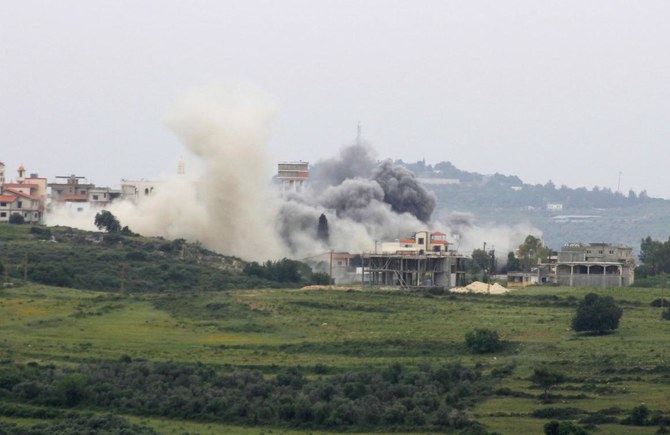
- No injuries or damages were reported
BEIRUT: Hamas’s armed wing said its militants in Lebanon’s south launched Monday a slew of rockets at a northern Israeli military position, as fighting has raged on in the Gaza Strip.
After Hamas’s October 7 attack on Israel triggered war in Gaza, its powerful Lebanese ally Hezbollah has exchanged near-daily fire with Israeli forces across the border.
Palestinian factions and other allied groups in Lebanon have also sometimes claimed attacks.
Hamas fighters “have fired a concentrated rocket barrage from south Lebanon toward” an Israeli military position, said the Ezzedine Al-Qassam Brigades in a statement on Telegram.
The armed wing described the action as a “response to the massacres of the Zionist enemy (Israel)” in Gaza and the occupied West Bank.
the Israeli army told AFP that “approximately 20 launches crossed from Lebanon into Israeli territory” but it had intercepted most rockets and struck “the sources of fire.”
“No injuries or damage were reported,” the army said.
The latest rocket barrage came as Hamas negotiators were expected to arrive in Egypt on Monday, where they were due to respond to Israel’s latest proposal for a long-sought truce in Gaza and hostage release.
On April 21, the Qassam Brigades claimed a rocket barrage into northern Israel.
A strike in January, which a US defense official said was carried out by Israel, killed Hamas deputy leader Saleh Al-Aruri and six other militants in Hezbollah’s south Beirut stronghold.
In Lebanon, at least 385 people have been killed in months of cross-border violence, mostly militants but also 73 civilians, according to an AFP tally.
The tally includes at least 11 Hamas fighters.
Israel says 11 soldiers and nine civilians have been killed on its side of the border.
Tens of thousands of people have been displaced on both sides.
Blinken ‘hopeful’ Hamas will accept ‘extraordinarily generous’ Gaza deal
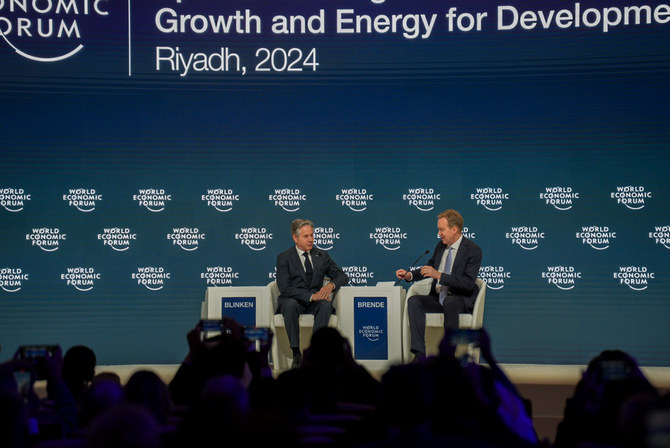
- Senior US official earlier joined the opening of a US-Gulf Cooperation Council meeting
RIYADH: US Secretary of State Antony Blinken said Monday he was hopeful Hamas would accept an “extraordinarily generous” offer to halt Israel’s Gaza offensive in return for the release of hostages.
“Hamas has before it a proposal that is extraordinarily, extraordinarily generous on the part of Israel,” Blinken said in Riyadh at the World Economic Forum.
“They have to decide — and they have to decide quickly,” Blinken said. “I’m hopeful that they will make the right decision.”
He also renewed US opposition to an Israeli offensive on Gaza’s southernmost city of Rafah, ahead of his trip to Israel.
“We have not yet seen a plan that gives us confidence that civilians can be effectively protected,” Blinken said.
Blinken earlier joined the opening of a US-Gulf Cooperation Council meeting, where he told the region’s foreign ministers that the best way to ease the humanitarian catastrophe in Gaza would be to negotiate a ceasefire agreement that would release hostages held by Hamas.
“The most effective way to address the humanitarian crisis in Gaza, to alleviate the suffering of children, women and men, and to create space for a more just and durable solution is to get a cease-fire and the hostages out,” he said.
“But we’re also not waiting on a ceasefire to take the necessary steps to meet the needs of civilians in Gaza.”
Blinken also told the GCC ministers that Iran’s confrontation with Israel showed the need for greater defense integration.
“This attack highlights the acute and growing threat from Iran but also the imperative that we work together on integrated defense.”
The top US diplomat met separately with Saudi Prince Faisal bin Farhan, Minister of Foreign Affairs, where they reviewed ways to strengthen bilateral relations and joint cooperation in various fields, the Saudi Press Agency said.















